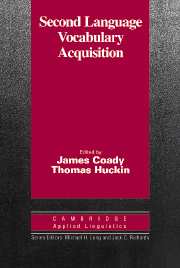Book contents
- Frontmatter
- Contents
- List of contributors
- Series editors' preface
- Acknowledgments
- I SETTING THE STAGE
- II CASE STUDIES
- Chapter 4 Vocabulary and comprehension: Two portraits
- Chapter 5 Oral production of vocabulary: A case study
- Chapter 6 Reading and vocabulary development in a second language: A case study
- III EMPIRICAL RESEARCH
- IV PEDAGOGY
- V SUMMING UP
- Author index
- Subject index
Chapter 5 - Oral production of vocabulary: A case study
Published online by Cambridge University Press: 05 October 2012
- Frontmatter
- Contents
- List of contributors
- Series editors' preface
- Acknowledgments
- I SETTING THE STAGE
- II CASE STUDIES
- Chapter 4 Vocabulary and comprehension: Two portraits
- Chapter 5 Oral production of vocabulary: A case study
- Chapter 6 Reading and vocabulary development in a second language: A case study
- III EMPIRICAL RESEARCH
- IV PEDAGOGY
- V SUMMING UP
- Author index
- Subject index
Summary
Despite general consensus as to the importance of the lexicon as an area for investigation, the research itself has taken many different paths. Nation, for example, in his review of the literature (1982), emphasized the following issues in vocabulary instruction: (1) whether vocabulary should be taught directly, (2) guidelines for instruction, and (3) the relative efficacy of techniques depending on whether the goal was receptive or productive learning. Gass (1987) presented research on the nature of the lexicon itself: (1) the nature of the learning of the lexicon, (2) lexical organization, and (3) lexical use. Carter's introduction in Nation and Carter (1989) offered an overview in terms of (1) quantity, (2) processing, (3) evaluation, (4) difficulty, and (5) development. And Huckin, Haynes, and Coady (1993) have most recently chosen to focus on the intimate connection between vocabulary acquisition and reading. The research presented here focuses on the process of vocabulary acquisition in the second or foreign language context.
Background
In order to be able to focus on questions concerning the process of vocabulary acquisition, an applied study was determined to be more appropriate than an experimental study because it would allow the research to be conducted in natural learning situations, with minimal researcher intervention (Firestone & Dawson, 1988).
Because I was myself at the stage of learning a language where I had passed the initial focus on grammar and was beginning to turn my attention to the task of vocabulary acquisition, I decided to use myself as subject in a longitudinal case study of the process of vocabulary acquisition.
- Type
- Chapter
- Information
- Second Language Vocabulary AcquisitionA Rationale for Pedagogy, pp. 69 - 97Publisher: Cambridge University PressPrint publication year: 1996



